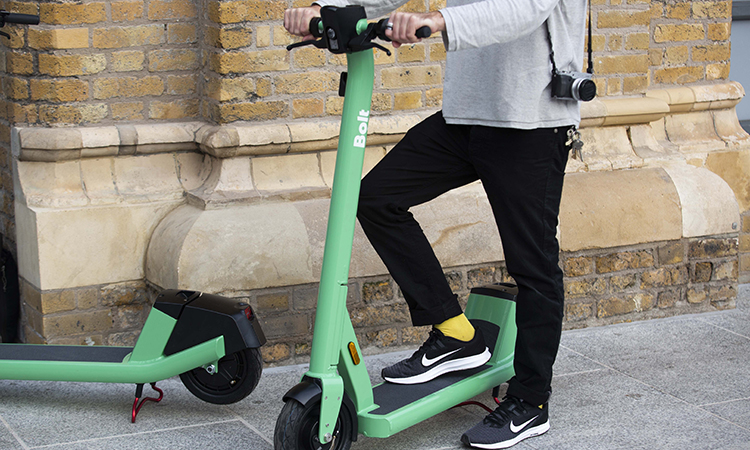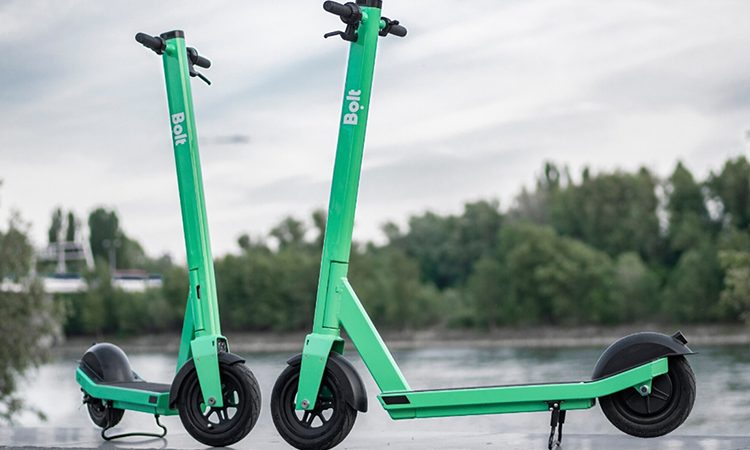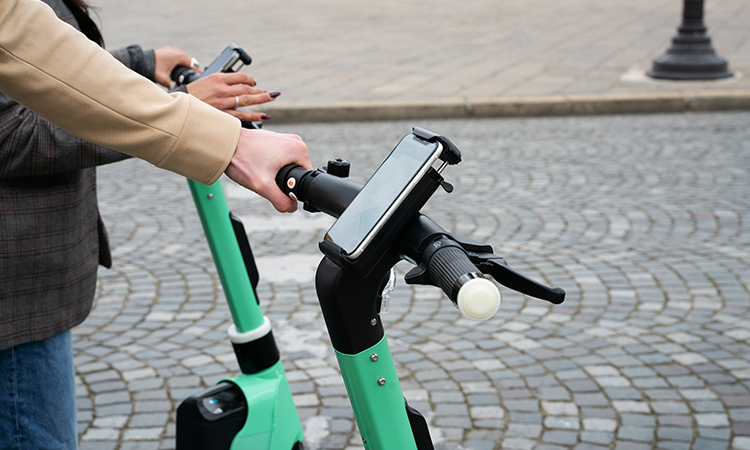Do shared scooters have a place in future cities?
- Like
- Digg
- Del
- Tumblr
- VKontakte
- Buffer
- Love This
- Odnoklassniki
- Meneame
- Blogger
- Amazon
- Yahoo Mail
- Gmail
- AOL
- Newsvine
- HackerNews
- Evernote
- MySpace
- Mail.ru
- Viadeo
- Line
- Comments
- Yummly
- SMS
- Viber
- Telegram
- Subscribe
- Skype
- Facebook Messenger
- Kakao
- LiveJournal
- Yammer
- Edgar
- Fintel
- Mix
- Instapaper
- Copy Link
Posted: 12 April 2023 | Dmitri Pivovarov - Bolt | No comments yet
Dmitri Pivovarov, Vice President for Rentals at Bolt, considers how the April 2023 Paris referendum, in which citizens voted against the continued presence of shared scooters in the city, highlights the limitations of competitive tenders within the micro-mobility industry and shares his thoughts on the benefits of a free market scenario, which encourages healthy competition amongst operators.


Credit: Bolt
The Paris referendum to ban scooters proves that competitive tenders are not a viable solution for shared micro-mobility. Let me explain.
The city of Paris held a referendum on 2 April 2023, asking citizens if they wanted shared scooters in the city. The majority of those who casted their vote said “no” to scooters. However, the impact that the vote should have is questionable, since only 8% of those eligible actually voted. That roughly represents 1% of the total metro area’s population. Furthermore, e-voting was not allowed, arguably excluding those with busy lives from the process.
Previously, in 2020, Paris organised a competitive tender: a process by which city officials authorised only three companies to put scooters on the streets. Since a referendum was needed in 2023, it’s safe to say that the tender has failed, which indicates that the selection procedure based on promises is not the best solution for choosing shared scooter operators.
Micro-mobility tenders versus a free market scenario
Let’s start by explaining what a tender is and why it doesn’t fit micro-mobility industry specifics. It is a highly formalised bureaucratic procedure of purchasing goods or services by public entities, including cities. It aims to establish clear requirements and criteria for selecting providers. The key selection criterion is usually the price of the offer. It may work quite well for purchasing goods, but it doesn’t work at all for establishing shared scooter schemes. It limits the number of scooter operators in a city and blocks healthy competition between the companies, resulting in a more expensive and lower quality service for end users.
Without a tender, the free market forces the operators to constantly adapt and upgrade their scooters and safety offering because they want to stay on top of the competition”
In a free market scenario, which is a more efficient option, operators need to constantly compete with each other to make sure that they bring the best value and service quality for customers. In addition to offering the most affordable price, this includes competing for better safety solutions that customers and other people living in the city value. Without a tender, the free market forces the operators to constantly adapt and upgrade their scooters and safety offering because they want to stay on top of the competition.
Tenders create a sense of compliance that leads to the blocking of innovation. Imagine a situation where, as a result of a tender, three companies get the license to operate scooters for three years in a city. Are they incentivised to invest and bring the best solutions to the city, since their incumbency is guaranteed for 36 months and there is no competition? Not really. Three years is an era for the sharing industry. For reference, in less than two years, at Bolt, we launched a patent-pending tandem riding prevention system, an artificial intelligence (AI) parking system, a cognitive reaction test to tackle drunk riding and a score to track reckless riding and ultimately ban riders that don’t follow safety rules.


Credit: Bolt
Shared scooters are safer overall than other individual modes of transport, including private scooters. Shared scooter fleets can bundle hardware and software solutions to bring new safety features to the market quickly. The most prominent example affecting safety is vehicle speed – all shared scooters have a speed limit; private ones don’t. This results in personal scooters going 10, 20 or even 40km/h faster than shared ones, creating risks for riders and everyone on the streets.
Tenders also fail customers and cities when it comes to pricing. The mayor of Paris complained that a 10-minute scooter ride in Paris costs as much as €5. In an open market scenario, operators compete for customers and try to offer the best prices and discounts. Price competition doesn’t happen when competition is artificially restricted.
Many people started asking questions about the future of shared scooters as a result of the Paris vote, but it is unlikely that the trend of shared micro-mobility gaining popularity across Europe will actually change.
Fewer private car journeys thanks to shared scooters
Private cars are the primary cause of many problems that cities are facing today, whether that’s traffic congestion, air and noise pollution, or simply lack of space. Shared scooters have a huge potential to support cities in tackling these challenges by shifting people away from using private cars for shorter inner-city trips. According to the World Health Organisation (WHO), over 30% of car journeys in Europe cover distances of under 3km, and 50% cover less than 5km. These are perfect distances to cover with a scooter instead of a two-tonne vehicle. Embracing shared scooters means less private cars in cities, which in turn creates more people-friendly urban areas.
Shared scooters have a huge potential to support cities in tackling these challenges by shifting people away from using private cars for shorter inner-city trips”
At Bolt, we conducted research to understand if shared scooters can replace private car trips. Looking at data gathered in 17 of the countries where we operate scooters, we found that the use of our scooters avoided more than 2.4 million kilograms of CO2 emissions in 2022. That’s the equivalent of emissions produced by more than 2,600 flights from Paris to New York City.
In addition to the sustainability benefits, shared scooters have been shown to integrate seamlessly into existing public transport networks. Our internal study showed that almost 40% of Bolt scooter trips are connected to public transport and serve as the first- or last-mile option for customers. This is a crucial service for city inhabitants, especially those living in areas which lack dense public transport connections.


Credit: Bolt
Safety is top of mind
Discussion around shared scooters often concentrates on the safety of both riders and pedestrians. This was the case in Paris, too. Safety is a topic that we take incredibly seriously across the 260 European cities in which we operate scooters. In 2021, we increased the number of our scooter rides five times compared to the previous year, while the ratio of injuries decreased by 26% and ratio of accidents by 12% over the same period of time. This is a result of the safety features that we’ve applied to our scooters.
There are always going to be some riders who try to flout the rules. This is why we recently introduced a reckless rider’s score, which evaluates a rider’s behaviour based on a wide set of inputs collected from our scooters and ranks the rider against other Bolt customers. If a rider uses Bolt scooters recklessly on a regular basis and has a score that falls within the lowest percentile among all riders, then they receive a notification and educational materials to encourage them to ride more responsibly. If they fail to improve their behaviour over time, they can ultimately get suspended from using Bolt services. The feature has been launched in several cities – including Lisbon, Berlin and Stockholm – and we will introduce it to many more cities soon.
Converting as little as 1% of car parking areas into micro-mobility parking spots would make a huge difference”
Another factor which influences the debate on scooters is parking. This is where the cities themselves can do a lot. One car parking spot can accommodate up to 12 scooters. Converting as little as 1% of car parking areas into micro-mobility parking spots would make a huge difference. According to a survey commissioned by Bolt in November 2022, 67% of people surveyed in Portugal, 42% in Germany and 44% in Norway agreed that converting car parking spots into scooter parking spots would benefit their city.
To ensure that our scooters are parked correctly, we’ve implemented an AI parking system which automates the process of analysing scooter parking pictures, provides quick feedback and educates riders on proper scooter parking. This has been very effective in improving scooter parking practice among Bolt customers – for example, in Stockholm, the likelihood of incorrect parking after a ride has finished dropped by almost 40% within 30 days after the first improper parking notification was received by a rider.
It’s all about the people
When talking about shared scooters, people usually discuss the big picture, just as I did above. But there are also very personal stories to be told. People are using scooters for commuting, and visiting their friends and family. A woman quoted by France 24 said that scooters helped her grandchildren – who live on the other side of Paris – to visit her. The journey took only 25 minutes on a scooter and more than an hour using other means of transport. She seemed quite sorry that the scooters will be phased out of the city.
I’m sure that there are plenty more similar stories to be told, not only in Paris, but in other cities across Europe, too. Whether people use them to commute, visit their friends or family, or just go about their daily lives, shared scooters have become a vital part of people’s lives. At Bolt, we’re proud to provide this service to millions of people in over 260 cities across Europe. We regret that Paris isn’t going to be one of them.


Related topics
Artificial Intelligence, Fleet Management & Maintenance, Infrastructure & Urban Planning, Micro-mobility, Mobility Services, Modal shift, Passenger Experience, Sustainable Urban Transport, Vehicle & Passenger Safety
Related modes
Bikes & Scooters
Related cities
Paris
Related countries
France
Related organisations
Bolt
Related people
Dmitri Pivovarov








